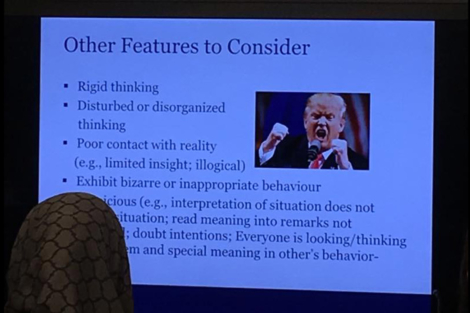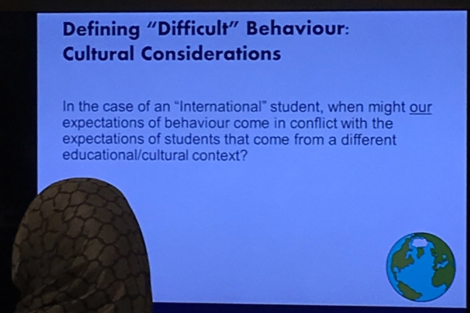Invigilators at Test and Exam Services (TES) are speaking out over what they see as discriminatory training sessions, which have been described as “clearly [pathologizing] students with disabilities.”
TES is “the department responsible for coordinating quiz, term test, and final examination accommodations for students with documented disabilities,” according to its website. It employs roughly 40 to 45 “highly-qualified graduate students” to act as invigilators.
The issue regarding training sessions was first brought to light by a Facebook post made by an invigilator who had attended a training session on September 5.
In her post, which has been shared over 100 times, graduate student Elizabeth Davis wrote that “the training contained strong ableist and discriminatory content which is inappropriate and wrong to disseminate in a training environment for Invigilators working with students with disabilities.”
In particular, she and other invigilators took issue with two presentation slides that they believed described students with disabilities as “difficult” and comparable to US President Donald Trump.
The slides were presented as part of their training to become invigilators.
In an interview with The Varsity, Senior Director of Student Experience David Newman clarified that those slides were part of general de-escalation training given by the Student Progress and Support Team and were not specific to students with disabilities.
“The training was really about dealing with difficult situations and it was not about any specific group and it was not developed specifically for this group,” said Newman.
Newman continued that this presentation is given to many groups on campus, though he did not specify which ones.
“It’s a general type of presentation that is given to any group that there’s a large population of at the university… It’s a wide range of groups that training is provided to.”
Davis questioned the university’s explanation, saying that “if they weren’t there to talk about students with disabilities, why were they training us?”
“They’re invited to come train people who work with students with disabilities and they weren’t talking about students with disabilities… There’s something that doesn’t add up to me about that defence,” Davis said.
U of T Professor Tanya Titchkosky, who specializes in Disability Studies, told The Varsity that she saw the issues brought up at this training session as part of a growing trend at U of T of a “disregard of disability as a human rights issue.”
“To train people to conceive of disability as a burden and as a problem and not to include any training on human rights, I don’t know how that’s going to help anybody, including the employees at [TES],” Titchkosky said. “All they do is confirm a stereotype.”
Beyond training that seemingly described disabled students as “difficult,” Davis also said in her post that invigilators were told to see their jobs as related to “customer service.”
“I am deeply upset by this frank espousal of commitment to structuring social justice issues like accessibility as ‘customer service issues,’” Davis wrote. “However, what is directly relevant to this incident, is that a human rights issue is being framed as a customer service issue at the highest levels of administration at the University of Toronto, and at TES specifically, and this appears to be systematically linked to ableism, racism and poor labor practices.”
The description of TES as providing a customer service was confirmed by two other invigilators who wished to remain anonymous for fear of reprisal.
Davis also noted in her Facebook post that she was the only person who spoke out at the training session because “the environment for Invigilator staff at TES has become so toxic, and Invigilator staff are subject to such punitive reprimand for any disagreement with management staff, that no one wants to speak up about anything even when what is happening is clearly wrong.”
Two current invigilators and one former invigilator agreed with Davis’ description of the “toxic” atmosphere at TES. The former invigilator told The Varsity that staff would be admonished when they tried to speak out against problems that they saw, particularly when it was about standing up for students.
The invigilators who spoke to The Varsity said that issues with the university’s treatment of disability have been a longstanding problem that has become worse in recent years. They point to the example of training that increasingly recommends that invigilators call police when they encounter difficulties.
Davis confirmed this in her post. “One thing that was continually emphasized in this training was that Invigilator staff can and should call Campus Police, as well as 911, when appropriate.”
When asked about what the university plans to do about these complaints, Newman said, “Certainly we are always reviewing the training based on feedback and we will be doing so in this instance as well.”
Titchkosky, when asked what she thought the university could do, said that people need to “start thinking about the conception of disability they’re working with.”
“It seems to me most classrooms seem to think disability is something you might encounter elsewhere,” Titchkosky said. “But they don’t really expect that blind students are showing up or deaf students are showing up.”




